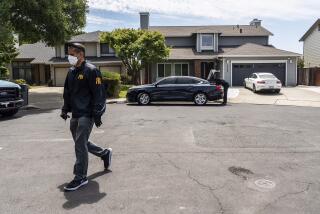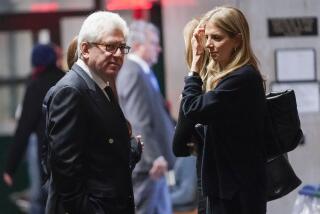U.S. Offers Motive as Andersen Trial Begins
- Share via
HOUSTON — A cadre of Arthur Andersen partners, fearing the consequences of their shoddy audit of Enron Corp., decided to shred documents last year before receiving a subpoena, prosecutors told a federal jury Tuesday.
In opening statements during the first criminal trial arising from Enron’s meltdown, a federal prosecutor said Andersen executives initiated the destruction because they believed the firm’s record of run-ins with regulators meant that a new scandal probably would result in the Securities and Exchange Commission suspending the firm from auditing public companies.
Tuesday’s opening statement marked the first time prosecutors have tried to attach a motive to Andersen’s alleged obstruction. A grand jury indicted the firm March 7, and Andersen has pleaded not guilty. A conviction could doom the Chicago-based accounting giant, which is seeing an exodus of clients and international affiliates. An acquittal could trip up the federal investigation of Enron.
Andersen repeatedly tried Tuesday to block prosecutors from discussing the details of the previous civil accounting-fraud cases involving the firm, saying they were irrelevant. Such prior acts often are inadmissible as evidence, but courts have allowed exceptions for certain reasons, such as proving motive. Defense lawyers typically fight the admission of prior so-called bad acts, analysts say, because they tarnish the character of the defendant and force attorneys to rebut additional allegations.
But after U.S. District Judge Melinda Harmon denied the defense bid, prosecutors told the jury that Andersen last year agreed to pay a $7-million fine to settle an SEC complaint alleging the accounting firm issued misleading audits that enabled a client, trash-hauler Waste Management Inc., to inflate earnings by $1 billion from 1993 to 1996. The settlement also included an injunction forbidding Andersen from violating securities laws in the future.
Prosecutors also cited the Sunbeam Corp. case, in which Andersen last year agreed to pay $110 million to settle a lawsuit filed by Sunbeam shareholders claiming the accounting firm helped Sunbeam improperly boost profit.
The prosecution’s first witness, SEC enforcement official Thomas Newkirk, told the jury that the regulatory agency had made clear in recent years that any firm found to be a repeat offender could expect harsher treatment, including being prohibited from auditing public companies.
Even before he took the stand, however, prosecutors began describing internal activity at Andersen they said indicated the firm “knew the SEC was coming.”
Assistant U.S. Atty. Matt Friedrich, one of three prosecutors, told the jury that Nancy Temple, an Andersen attorney in Chicago, wrote in an internal memo in October about the firm’s potential legal exposure in its audit of Enron. Nineteen minutes later, Friedrich said, she sent an unusual e-mail to Michael Odom, a senior partner in Andersen’s Houston office, asking him to make sure the office was in compliance with Andersen’s document-retention policy, which calls for destroying documents deemed unnecessary to support an audit’s conclusions.
Friedrich said the prosecution plans to show jurors a videotape of Odom explaining the policy to Andersen employees, in which he says they can shred documents until the day they receive a subpoena.
Andersen’s lead attorney, Rusty Hardin, seized on the videotape--apparently a training film--to poke holes in the notion that senior Andersen officials devised a strategy to secretly destroy their Enron records.
“What kind of conspiracy is launched on videotape?” he asked.
Hardin made his statement after losing a bid to bar any mention of Andersen’s previous accounting troubles. He told Judge Harmon that citing the regulators’ complaints would be “tremendously misleading” to the jury.
“What we’re doing now is trying Arthur Andersen for their accounting,” Hardin protested at one point, to no avail.
Both sides took every chance to criticize Enron, potentially signaling that the trial will preview the themes of a broader case against the now-bankrupt energy trader.
In his opening statement, Friedrich said Enron “pushed the edges” of accounting. Hardin recalled Enron, once Andersen’s second-largest client, as a “hard-charging, up to the line-type company.”
The legal attack on Andersen is expected to sharpen today as more witnesses testify. Prosecutors are expected to call Carl Bass, a Houston-based member of Andersen’s Professional Standards Group, a team of accounting specialists who provide guidance on complex auditing issues.
Bass is expected to testify that former Andersen partner David B. Duncan and other Andersen executives who worked on the Enron audit ignored his advice about how to account for off-the-books partnerships. Bass was removed from dealings with Enron in March 2001, after Enron’s chief accounting officer complained about him to Andersen.
In court Tuesday, Hardin downplayed the suggestion that Enron had held sway over Andersen.
Andersen has said employees destroyed Enron-related documents last fall in a belated attempt to comply with the firm’s document-retention policy.
But prosecutors said Andersen’s policy was “targeted at Enron” and did not encompass documents from other clients.
More to Read
Inside the business of entertainment
The Wide Shot brings you news, analysis and insights on everything from streaming wars to production — and what it all means for the future.
You may occasionally receive promotional content from the Los Angeles Times.









